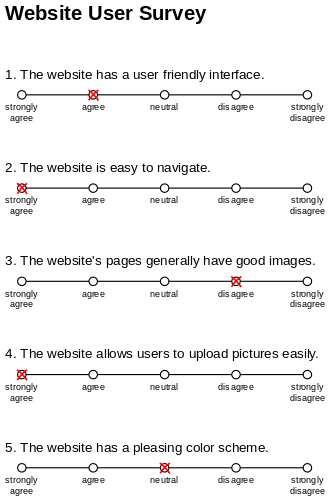Likert scale
A psychometric scale commonly used in questionnaires
Likert Scale[edit]

A Likert scale is a psychometric scale commonly involved in research that employs questionnaires. It is the most widely used approach to scaling responses in survey research, such that the term is often used interchangeably with rating scale, although there are other types of rating scales.
History[edit]
The Likert scale was developed by Rensis Likert, an American psychologist, in 1932. Likert devised the scale as a means of measuring attitudes by asking people to respond to a series of statements about a topic, in terms of the extent to which they agree with them, and so tapping into the cognitive and affective components of attitudes.
Structure[edit]
A typical Likert scale is composed of a series of statements, each of which the respondent is asked to evaluate according to any kind of subjective or objective criteria; generally, the level of agreement or disagreement is measured. The scale is named after its inventor, Rensis Likert.
The format of a typical five-level Likert item is:
- Strongly disagree
- Disagree
- Neither agree nor disagree
- Agree
- Strongly agree
Usage[edit]
Likert scales are used in a wide variety of settings, including psychology, sociology, business, and education. They are particularly useful in measuring attitudes, opinions, and behaviors. The data obtained from Likert scales are often used in statistical analysis to determine trends and patterns.
Analysis[edit]

The data from Likert scales are typically treated as ordinal data, which means that while the order of the responses is meaningful, the intervals between them are not necessarily equal. However, many researchers treat Likert scale data as interval data for the purposes of statistical analysis, using techniques such as mean and standard deviation.
Advantages and Disadvantages[edit]
Advantages[edit]
- Easy to construct and administer.
- Provides a simple way to gauge opinions and attitudes.
- Can be used to collect data from large samples.
Disadvantages[edit]
- May not capture the full range of opinions.
- Assumes equal intervals between response options.
- Can be subject to response bias.
Related pages[edit]
Ad. Transform your life with W8MD's Budget GLP-1 injections from $75


W8MD offers a medical weight loss program to lose weight in Philadelphia. Our physician-supervised medical weight loss provides:
- Weight loss injections in NYC (generic and brand names):
- Zepbound / Mounjaro, Wegovy / Ozempic, Saxenda
- Most insurances accepted or discounted self-pay rates. We will obtain insurance prior authorizations if needed.
- Generic GLP1 weight loss injections from $75 for the starting dose.
- Also offer prescription weight loss medications including Phentermine, Qsymia, Diethylpropion, Contrave etc.
NYC weight loss doctor appointmentsNYC weight loss doctor appointments
Start your NYC weight loss journey today at our NYC medical weight loss and Philadelphia medical weight loss clinics.
- Call 718-946-5500 to lose weight in NYC or for medical weight loss in Philadelphia 215-676-2334.
- Tags:NYC medical weight loss, Philadelphia lose weight Zepbound NYC, Budget GLP1 weight loss injections, Wegovy Philadelphia, Wegovy NYC, Philadelphia medical weight loss, Brookly weight loss and Wegovy NYC
|
WikiMD's Wellness Encyclopedia |
| Let Food Be Thy Medicine Medicine Thy Food - Hippocrates |
Medical Disclaimer: WikiMD is not a substitute for professional medical advice. The information on WikiMD is provided as an information resource only, may be incorrect, outdated or misleading, and is not to be used or relied on for any diagnostic or treatment purposes. Please consult your health care provider before making any healthcare decisions or for guidance about a specific medical condition. WikiMD expressly disclaims responsibility, and shall have no liability, for any damages, loss, injury, or liability whatsoever suffered as a result of your reliance on the information contained in this site. By visiting this site you agree to the foregoing terms and conditions, which may from time to time be changed or supplemented by WikiMD. If you do not agree to the foregoing terms and conditions, you should not enter or use this site. See full disclaimer.
Credits:Most images are courtesy of Wikimedia commons, and templates, categories Wikipedia, licensed under CC BY SA or similar.
Translate this page: - East Asian
中文,
日本,
한국어,
South Asian
हिन्दी,
தமிழ்,
తెలుగు,
Urdu,
ಕನ್ನಡ,
Southeast Asian
Indonesian,
Vietnamese,
Thai,
မြန်မာဘာသာ,
বাংলা
European
español,
Deutsch,
français,
Greek,
português do Brasil,
polski,
română,
русский,
Nederlands,
norsk,
svenska,
suomi,
Italian
Middle Eastern & African
عربى,
Turkish,
Persian,
Hebrew,
Afrikaans,
isiZulu,
Kiswahili,
Other
Bulgarian,
Hungarian,
Czech,
Swedish,
മലയാളം,
मराठी,
ਪੰਜਾਬੀ,
ગુજરાતી,
Portuguese,
Ukrainian